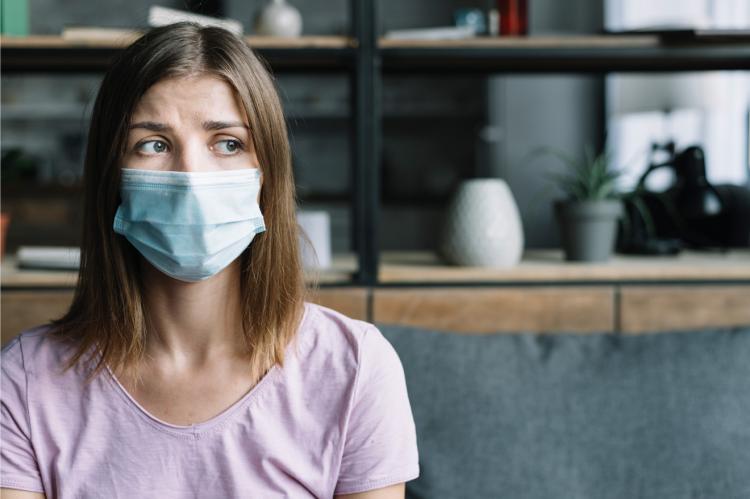Five reasons to still wear a mask even after you’re vaccinated
As an emergency physician, Dr. Eugenia South was in the first group of people to receive a COVID vaccine. She received her second dose last week. Yet South said she’s in no rush to throw away her face mask.
“I honestly don’t think I’ll ever go without a mask at work again,” said South, faculty director of the Urban Health Lab at the University of Pennsylvania in Philadelphia. “I don’t think I’ll ever feel safe doing that.”
And although COVID vaccines are highly effective, South plans to continue wearing her mask outside the hospital as well. Health experts say there are good reasons to follow her example.
“Masks and social distancing will need to continue into the foreseeable future — until we have some level of herd immunity,” said Dr. Preeti Malani, chief health officer at the University of Michigan. “Masks and distancing are here to stay.”
Malani and other health experts explained five reasons Americans should hold on to their masks:
1. No vaccine is 100% effective.
Large clinical trials found that two doses of the Moderna and Pfizer-BioNTech vaccines prevented 95% of illnesses caused by the coronavirus. While those results are impressive, 1 in 20 people are left unprotected, said Dr. Tom Frieden, a former director of the Centers for Disease Control and Prevention.
2. Vaccines don’t provide immediate protection.
No vaccine is effective right away, Malani said. It takes about two weeks for the immune system to make the antibodies that block viral infections.
COVID vaccines will take a little longer than other inoculations, such as the flu shot, because both the Modena and Pfizer products require two doses. The Pfizer shots are given three weeks apart; the Moderna shots, four weeks apart.
In other words, full protection won’t arrive until five or six weeks after the first shot. So, a person vaccinated on New Year’s Day won’t be fully protected until Valentine’s Day.
3. COVID vaccines may not prevent you from spreading the virus.
Vaccines can provide two levels of protection. The measles vaccine prevents viruses from causing infection, so vaccinated people don’t spread the infection or develop symptoms.
Most other vaccines — including flu shots — prevent people from becoming sick but not from becoming infected or passing the virus to others, said Dr. Paul Offit, who advises the National Institutes of Health and Food and Drug Administration on COVID vaccines.
While COVID vaccines clearly prevent illness, researchers need more time to figure out whether they prevent transmission.
“We don’t yet know if the vaccine protects against infection, or only against illness,” said Frieden. “In other words, a vaccinated person might still be able to spread the virus, even if they don’t feel sick.”
Until researchers can answer that question, wearing masks is the safest way for vaccinated people to protect those around them.
4. Masks protect people with compromised immune systems.
People with cancer are at particular risk from COVID. Studies show they’re more likely than others to become infected and die from the virus, but may not be protected by vaccines, said Dr. Gary Lyman, a professor at Fred Hutchinson Cancer Research Center.
Although the vaccines appear safe, “prior studies with other vaccines raise concerns that immunosuppressed patients, including cancer patients, may not mount as great an immune response as healthy patients,” Lyman said. “For now, we should assume that patients with cancer may not experience the 95% efficacy.”
Some people aren’t able to be vaccinated.
While most people with allergies can receive COVID vaccines safely, the CDC advises those who have had severe allergic reactions to vaccine ingredients, including polyethylene glycol, to avoid vaccination. Lyman encourages people to continue wearing masks to protect those with cancer and others who won’t be fully protected.
5. Masks protect against any strain of the coronavirus, in spite of genetic mutations.
Global health leaders are extremely concerned about new genetic variants of the coronavirus, which appear to be at least 50% more contagious than the original.
One thing is clear: Public health measures — such as avoiding crowds, physical distancing and masks — reduce the risk of contracting all strains of the coronavirus, as well as other respiratory diseases, Frieden said. For example, the number of flu cases worldwide has been dramatically lower since countries began asking citizens to stay home and wear masks.
“Masks will remain effective,” Malani said. “But careful and consistent use will be essential.”
The best hope for ending the pandemic isn’t to choose between masks, physical distancing and vaccines, Offit said, but to combine them. “The three approaches work best as a team,” he said.
AS A PUBLIC SERVICE, OUR COVERAGE OF COVID-19 is shared here at no cost to our Facebook followers. If you find value in this information, please consider supporting our work by subscribing to our e-Edition for only $35/year. Follow this link to subscribe: https://www.etypeservices.com/The%20Canadian%20RecordID377/default.aspx?PubID=1443


